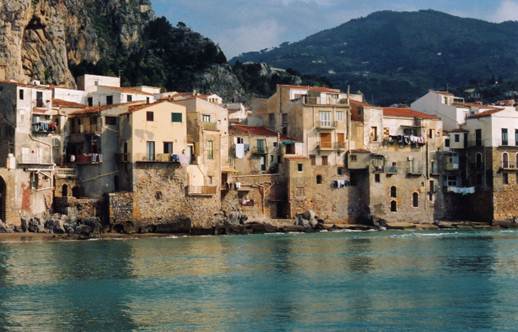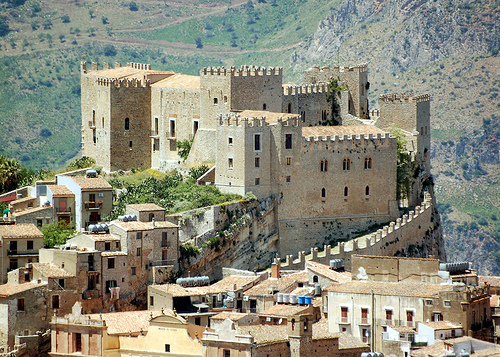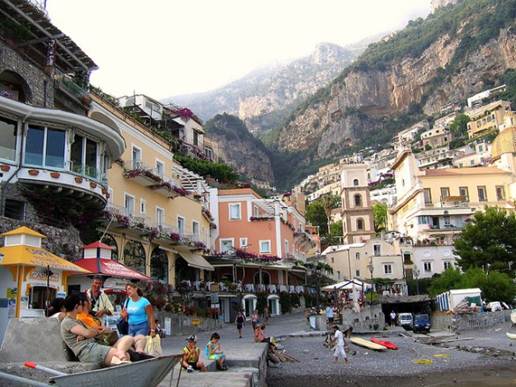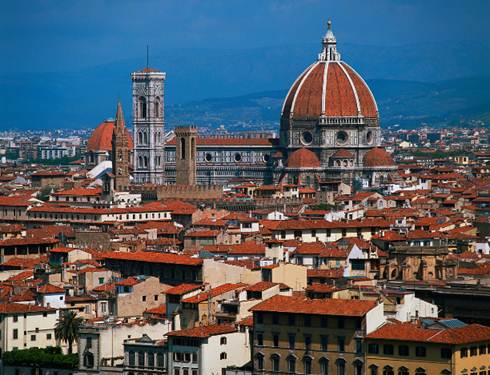Sicily may
have produced the real Shakespeare. Michelangelo Florio Crollalanza was born in
Messina in 1564, and is known as a writer of plays. During a religious
crackdown by the enforcers of papal authority, the young Calvinist fled to
England, aged 24, and settled with his mother’s cousin in Stratford-upon-Avon.
Crolla derives from the verb crollare, to shake, and lanza meant a spear. So,
the argument goes, the anglicized version of Crollalanza is… Shakespeare!

Sicily, Italy
Many buildings including the Palazzo
Aiutamicristo, visited by Charles V, and Castello di Caccamo in Palermo recall
the courtly life depicted in Much Ado About Nothing, which was written in 1598
at the end of Elizabeth I’s long reign when people were ready for change.
Inspiration for the central characters, Benedick and Beatrice, must have come
from II Cortegiano, the Book of the Courtier, a well-known text in Italy and
England in the 16th century. I felt like a courtier taking Emma
Thompson around Palermo discussing Much Ado About Nothing. It was her first
visit to Sicily.

Castello
di Caccamo in Palermo
Naples, the
home of Italian sorcery and magic, remains, even today, the most superstitious
place in the country. But also, paradoxically, it is one of the birthplaces of
modern science. The magicians of Naples were known as the “professors of
secrets”. Although some of their beliefs were mad, they dared to ask big
questions about the world. The alchemists of Naples believed that natural
contained hidden powers, which, if discovered, could be exploited for human
gain.
The Accademia dei Segreti provided a model for
Shakespeare’s last great character, Prospero of The Tempest. The playwright
located the island where Prospero was exiled somewhere off the coast of Naples
towards Tunisia. He may well have been on Stromboli – a volcanic island north
of Sicily.

the
coast of Naples towards Tunisia
Florence was
the birthplace of the Renaissance, a melting pot of ideas, new systems of
banking and trade, it was home not only to Leonardo da Vinci and Michelangelo,
but also to Niccolò Machiavelli, who wrote The Prince at his estate at
Sant’Andrea in Percussina, near San Casciano on the outskirts of Florence.
Shakespeare may have seen the magnificent 1532 edition, which is now in the
library in Florence or, as it was published in London in 1584, he may have
heard about it in the pubs of London. Most people think Machiavelli was a
villain, and several of Shakespeare’s plays are referred to as being
Machiavellian because of their devious and dishonest plotters (lago in Othello
and Edmund in King Lear). But this Italian diploma, soldier, statesman,
philosopher, historian, musician, poet and playwright stood for a world in
which man would take control to ensure that civilization flourished. Not
exactly ruthless, he was prepared to do whatever it took to obtain stability
(like Octavius in Antony and Cleopatra). With Mark Ryland I talked about the
psychological power of Octavius, and how strong his determination was to get
power even if it meant sacrificing friends.

View
of Florence, Italy
For more
information on the World Shakespeare Festival visit www.worldshakespearefestival.org.uk;
Shakespeare In Italy with Francesco da Mosto is screened on BBC Two in May
Insider tip: Don’t miss Albergaccio di
Niccolò Machiavelli (00 39 55 828 471), a winebar on the site of a tavern that
Machiavelli used to visit in San Casciano, near Florence. It serves wine from
the Antica Fattoria Machiavelli in Sant’Andrea in Percussina